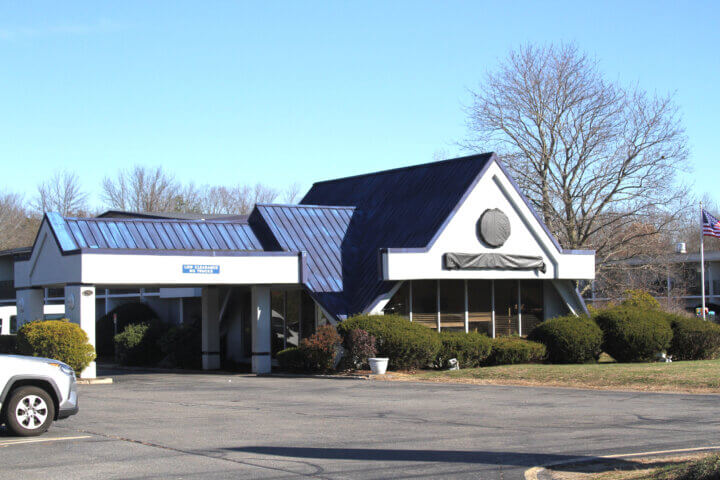By Dakota Antelman — Dakota@concordbridge.org
The state stopped sending new families to its Elm Street shelter last week after identifying an ongoing cockroach infestation and other problems at the site.

The Concord Bridge saw inspectors from the state Executive Office of Housing and Livable Communities arrive at the shelter on November 14, three days after the newspaper started asking questions about roaches and what Concord public health director Melanie Dineen said were “repeated septic backups.”
In a statement the next morning, a spokesperson for the EOHLC said inspectors found the pests during a “routine, annual inspection” of the shelter, which is operated by the non-profit Making Opportunity Count (MOC).
“We are working with MOC and the property owner to quickly address concerns [and] will continue to work with MOC and the town to safeguard the health and safety of the families in shelter,” the spokesperson said.
The Concord Health Department knew about plumbing issues in September and took action. Ten days before state inspectors confirmed the cockroach problem, Dineen said, she received an anonymous complaint about bugs.
While authorities respond to the problems, one woman — who said she was transferred to a different shelter after her room got flooded — remains frustrated with the owners and MOC.
“The whole place is like the most unsanitary place in the world,” Roberta Bowman told The Bridge.
Non-profit responds
The state leased the Best Western at Historic Concord beginning in March 2023 and turned it into an emergency shelter. More than 18 months later, the shelter is still open. It housed 104 families as of October 30, according to the EOHLC.
The EOHLC spokesperson said the shelter won’t receive any new families until MOC and the property owner address the infestation and other issues. He said halting placements to make way for remediation or repairs “is a standard practice and not unique to this site in particular.”
The spokesperson said the agency is “confident that this site can be remediated effectively and continue to serve families in the coming weeks.”
In a statement after the print version of this article went to press but before this article was published online, the spokesperson said that the “other concerns identified in the inspection are minimal.”
The spokesperson said the decision to pause shelter placements was “relative to the remediation of the infestation.”
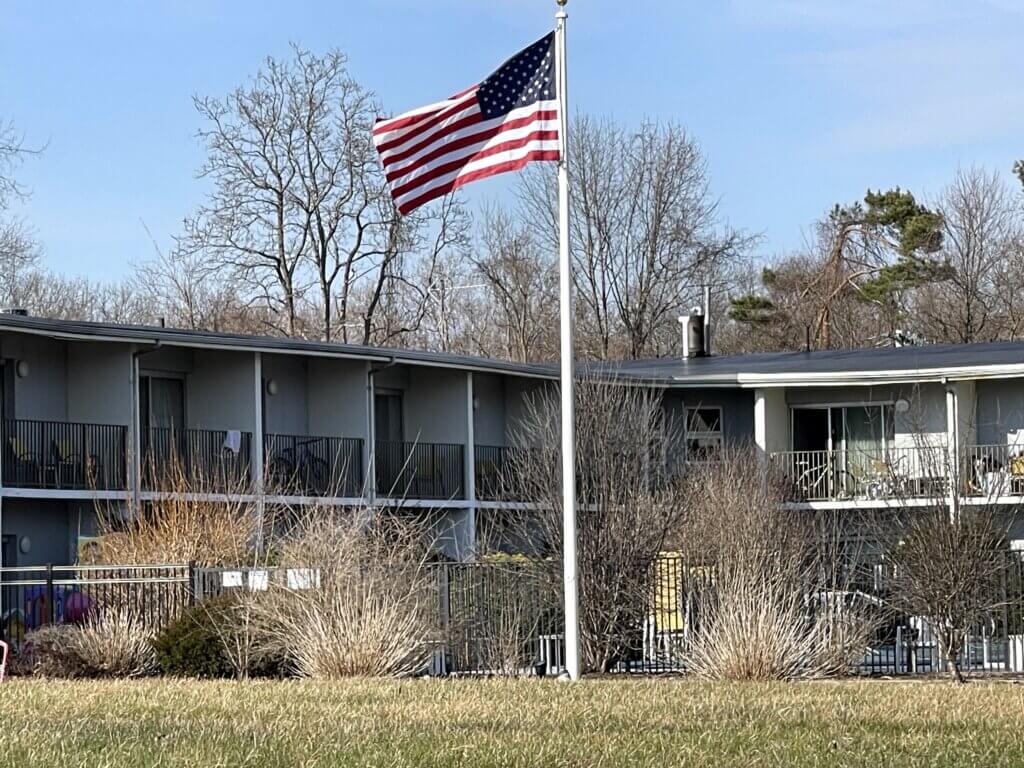
‘A valuable partner’
Many local and non-profit leaders praise the MOC-run program as a model for other facilities, and the EOHLC spokesperson called MOC “a valuable partner that has capably supported the families at this site.”
MOC vice president of programs Colby O’Brien said his organization has responded to cockroach sightings and plumbing issues in coordination with the property owners.
“The issue is a non-issue, in a way, because there [are] treatment plans,” he said of the insects. “There are things going on. We do regular check-ins. We make sure that the hotel is taking care of what they need to do.”
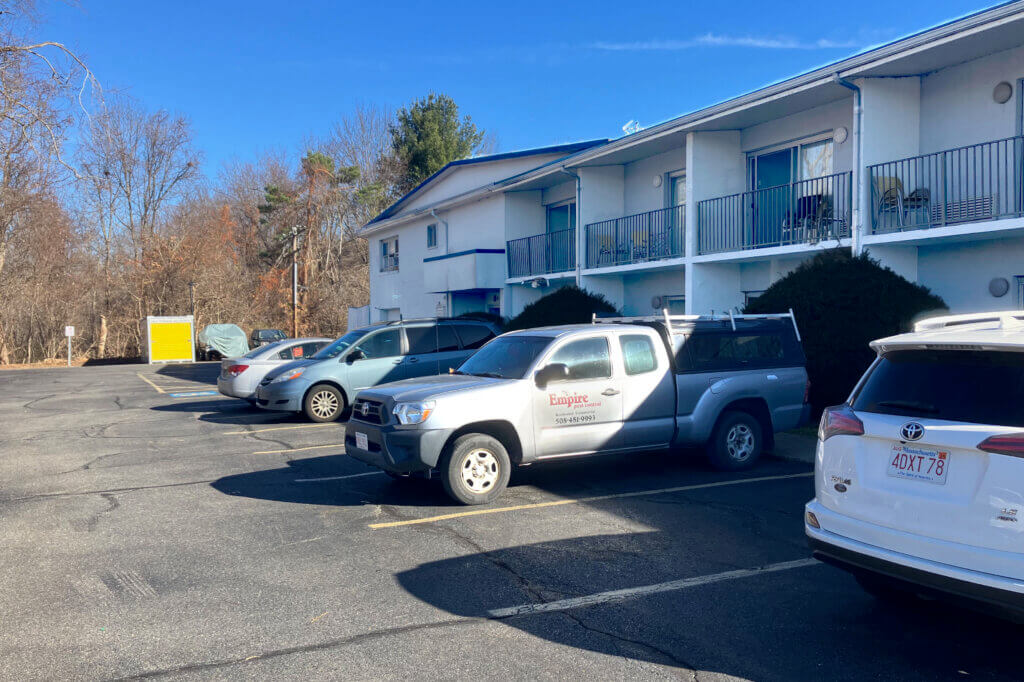
O’Brien referred some questions about the plumbing backups to the shelter’s landlord, Jamsan Hotel Management.
Said Jamsan executive Ashok Patel, “We have done our best to ensure all building systems function as designed.
“If there are problems, we address them right away,” he said in an email. “We are fully committed to our investment and will continue to support housing needs.”
Patel said Jamsan will “continue to work on any pest control issues with an outside professional pest control company.”
Dineen, Concord’s health director, said the town knew the shelter was having problems after people reported seeing septic trucks in the parking lot.
She said owners told the Health Department they were doing preventative maintenance. Then, she said, officials got a call from a resident reporting septic material in their room.
“Then,” Dineen said, “we were like, ‘Well, OK, what’s going on?’”

Flooded bathroom
Roberta Bowman said she was living at the Concord shelter when water started backing up in her shower drain. She said maintenance personnel tried to help but couldn’t solve the problem.
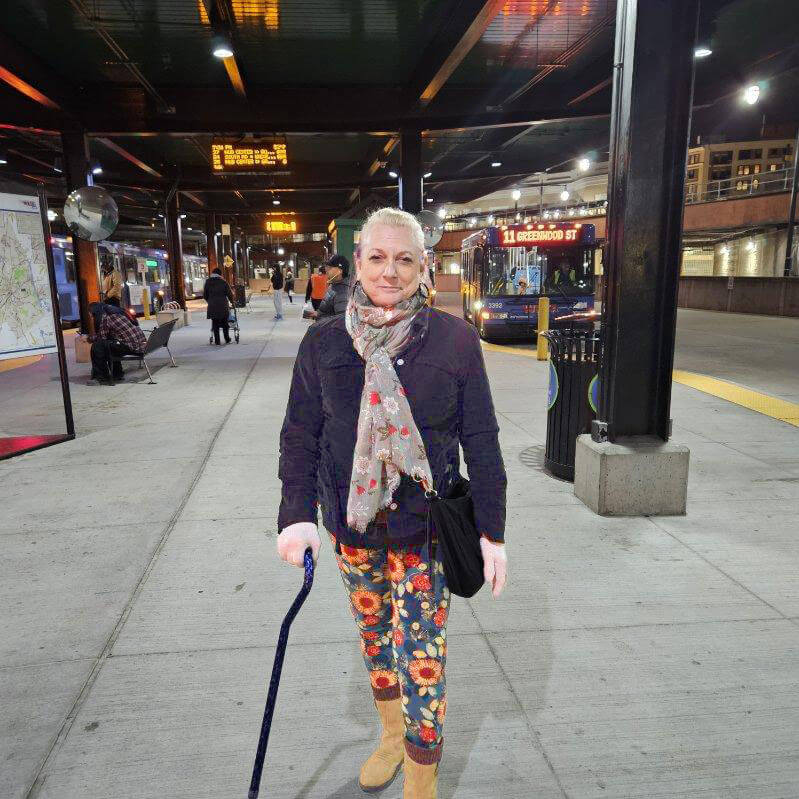
After more attempts at a solution, she said she woke up on September 13 to find her bathroom was flooded.
Bowman, who walks with a cane, said she slipped on the water and fell. She said she went to a local hospital in an ambulance.
Patel, the Jamsan executive, said “the guest” was taken to the hospital as a precaution. “[W]e believe she’s doing fine,” he said.
A man who identified himself as an employee but declined to give his name said he saw Bowman being loaded into the ambulance at the shelter. He said she returned four to five hours later.
The employee also said the plumbing issues stemmed from items including cat litter, baby wipes, and hair clogging the pipes.
Bowman pushed back. She has a cat but said she never flushed litter or any other debris down her drains.
“They do anything they could to act like I [was] clogging the toilet,” she said. “I’m a grown woman. My daughter is 21. We don’t flush towels down the toilet. We’re not mothers that are putting diapers in the toilet. It’s just not happening.”
Bowman reported the incident to the Concord Health Department and met with an inspector on September 18.
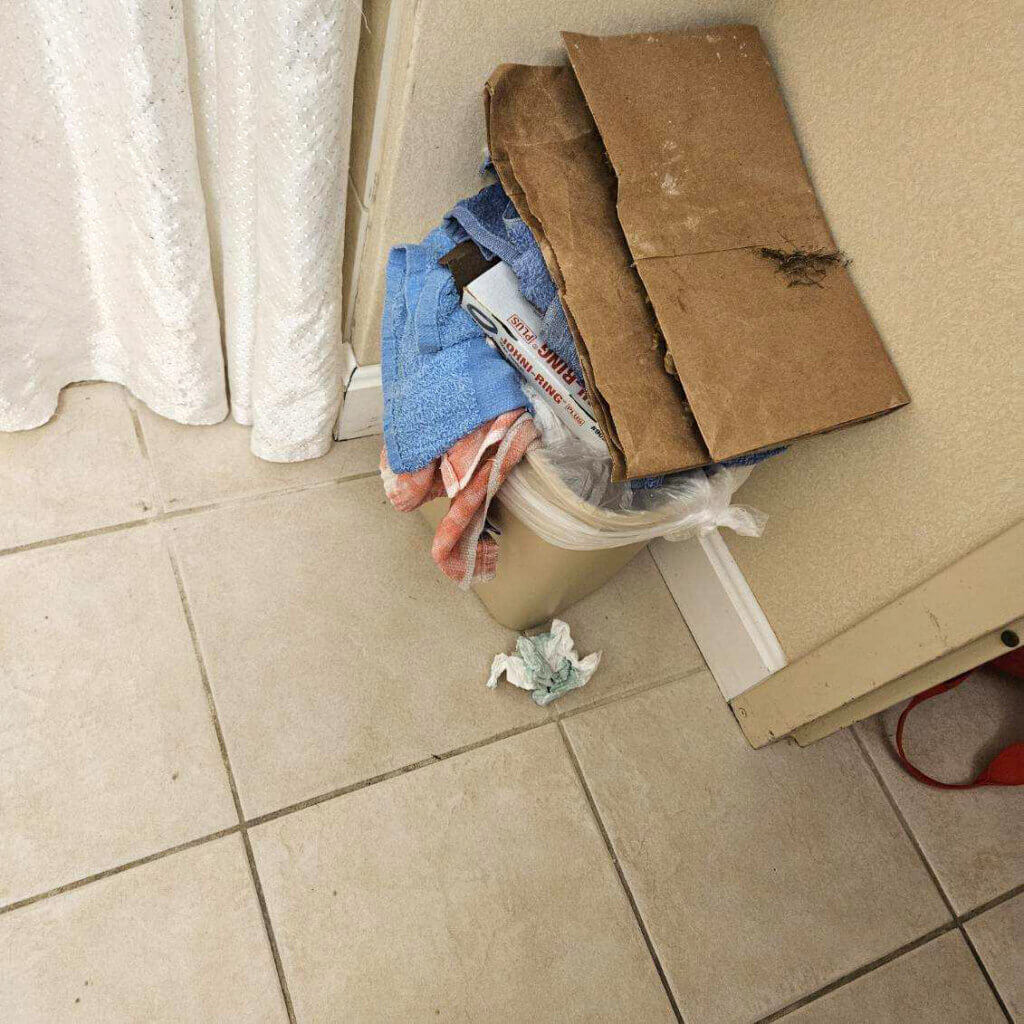
Relocated residents
Dineen said the state Department of Environmental Protection (DEP) had jurisdiction over the septic problems because of the system’s size.
While DEP investigated, Dineen told the shelter to stop using three rooms where the backups had occurred, she said.
MOC’s O’Brien said staff work with landlords to address building issues. After problems in Concord, O’Brien said, DEP shared flyers informing residents what they could — and could not — flush down their toilets and drains.
He said MOC tries to fix problems when they arise. If necessary, they relocate families.
“We’ve done that,” he said. “We will continue to do that. It’s something that we do as a program to make sure families are comfortable and safe in their rooms.”
Patel said, “All buildings in general have certain problems from time to time which are maintenance-related.” He said the staff “stays on top of all problems” and moves guests to different rooms at Elm Street “during some problem resolution process[es].”
Rather than stay in Concord, Bowman said she reluctantly transferred to a shelter in Auburn, much farther away from her doctors at Emerson Hospital.
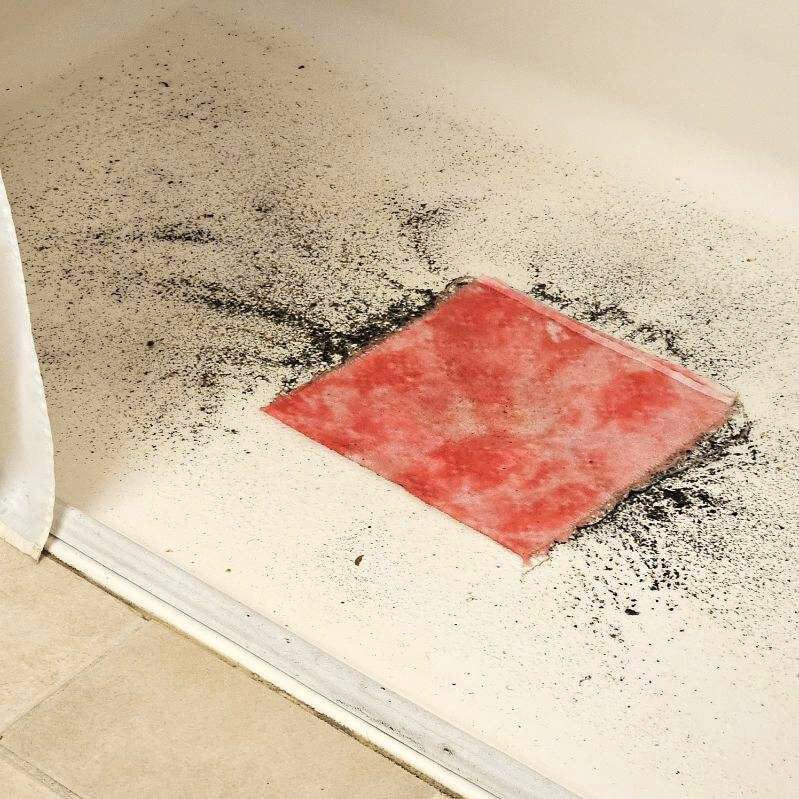
‘We’re full of cockroaches’
Dineen returned to the shelter on November 4 to reinspect the facility after owners made septic repairs. She cleared the shelter to resume using the affected rooms. As she left the building, though, she said an anonymous resident told her, “We’re full of cockroaches.”
Before that, Dineen said, the Health Department didn’t know about the roach infestation. She said she also wasn’t aware of infestations when the building operated as a hotel.
As she probed the resident’s complaint, she said the property manager gave her pest control reports that illustrated the scope of the problem.
The Concord Bridge obtained copies of reports dated August 20 and September 10. In the August 20 document, workers reported finding live cockroaches in 18 rooms. On September 10, workers found roaches in 24 units.
Workers described poor food storage in several rooms. Bowman said she cleaned her space meticulously but still saw roaches.
“Luckily, I got them one at a time,” she said.
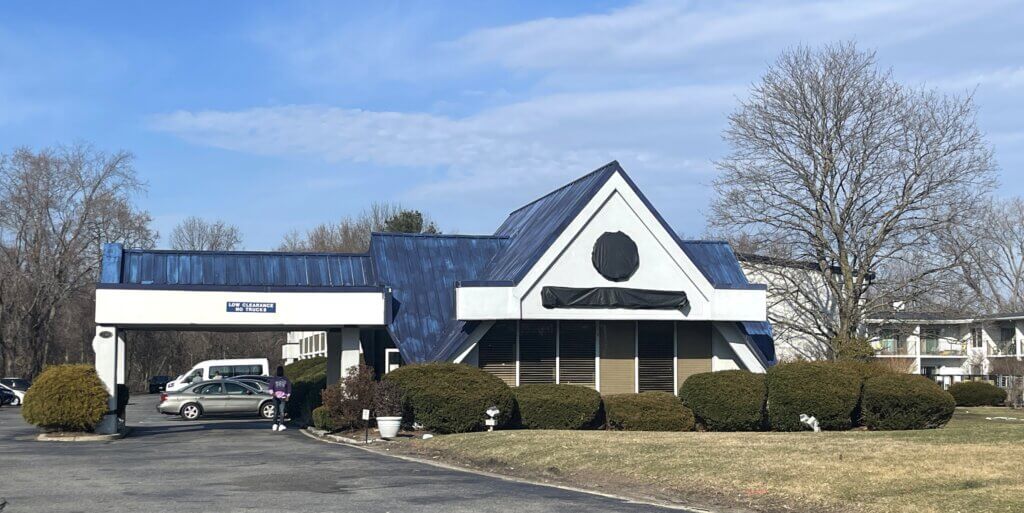
Public health nuisance
Dineen declared the cockroaches a public health nuisance and ordered the hotel’s ownership to abate the problem.
She acknowledged the owners were working with a pest control company and confirmed crews returned in October to continue treatments.
“They were dealing with it,” she said, “but not frequently enough.”
Dineen said she sent her order through certified mail. She also said she tried unsuccessfully to contact the property owners by phone.
Though the owners were hard for Dineen to reach, she said she was in touch with an on-site property manager who shared plans to bring pest control crews back.
Larger problem
O’Brien said the owners have a maintenance and regularly scheduled cleaning team in the building.
He said the property also has a pest control plan. When issues emerged, he said, staff notified the state and “responded immediately.” EOHLC did not respond to a question about whether the state knew about the cockroach infestation before its November 14 inspection.
O’Brien said there was a “significant issue” with cockroaches in August. Asked by The Bridge if the problem was more under control as of November 11, O’Brien responded, “100 percent.”
He also said cockroach infestations can affect people regardless of where they live. “Things come up — and they’re going to come up whether it’s a hotel, a shelter, or in your own home,” O’Brien said.

Retired UMass Amherst professor and cockroach expert Joseph Kunkel agrees with Dineen that monthly treatments probably weren’t enough to contain the shelter’s roaches. As workers ramp up their efforts, Kunkel said they’re in for a long fight.
Tenting and fumigating the hotel is one option, Kunkel said. So is baiting cockroaches and sealing off their hiding places.
Either way, Kunkel said there needs to be a robust long-term effort. “I’m not saying it’s a losing battle, but it’s a constant battle,” he said. “It’s not something where there’s a solution other than a dynamic one.”
In this case, Dineen said, the building’s use has changed. The shelter is now home to hundreds of people. What was once a “fairly minimal” continental breakfast is now a larger operation serving two meals per day.
Dineen said the situation also underscores much larger problems with housing as Massachusetts houses people in shelters like the one in Concord.
“If there was another easier [place] for people to go,” she said, “then we wouldn’t be having this conversation.”





